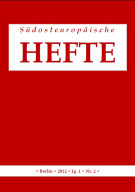Spatial detachment - emotional detachment: delocalizing and instrumentalizing local musical practice in the communist regimes of Southeastern Europe
Spatial detachment - emotional detachment: delocalizing and instrumentalizing local musical practice in the communist regimes of Southeastern Europe
Author(s): Eckehard PistrickSubject(s): Customs / Folklore
Published by: Südosteuropäische Hefte
Keywords: Musik; Volksmusik; Südosteuropa; postsozialistisches Land; Kultur; Identität; traditionelle Kultur; Kulturpolitik; Fest; kulturelle Identität; historische Entwicklung; Kultursoziologie; Kunstsoziologie; Ethnologie; music; popular music; cultural identity
Summary/Abstract: Cultural traditions in their local understanding are bound to particular places and to a particular social setting, possessing generally a high degree of interaction. The exercise of political power and the commercialization of traditional music have fundamentally shaken this interactive relation between sound, space and social action. Local identities and histories became confronted with constructed national identities and a homogenized national history. Musical practice witnessed a process of uprooting, the division of performers from their audience related to an emotional reconfiguration. The emotionally and spatially-bound cultural practice became redefined in terms of a static “cultural object” whose aesthetic properties were highlighted over its dynamic functional and interactional character. This progression from local tradition towards national folklore had many implications and was often accompanied or accelerated by state-directed audiovisual media. The symbolic distancing of musical practice from its origin had undeniable socio-political implications. Especially in the communist regimes of Southeastern Europe this act was interpreted as a logical parallel movement to the break with the ill-famed past in other spheres of the society. After the fall of the communist regimes cultural practice was re-appropriated and re-contextualized on an impressive scale by local actors. The return of the Local was guided by wider (cultural) politics of regionalization and re-traditionalization and the needs of a world-wide music market with a growing interest in what was called “authentic” and “rooted” musical practice. At the same time the brand “Balkan music” emerged, depicting an apolitical “emotional territory” which stood in sharp contrast to the image of the Balkans in the Western mediascape.
Journal: Südosteuropäische Hefte
- Issue Year: 1/2012
- Issue No: 2
- Page Range: 77-87
- Page Count: 11
- Language: English

